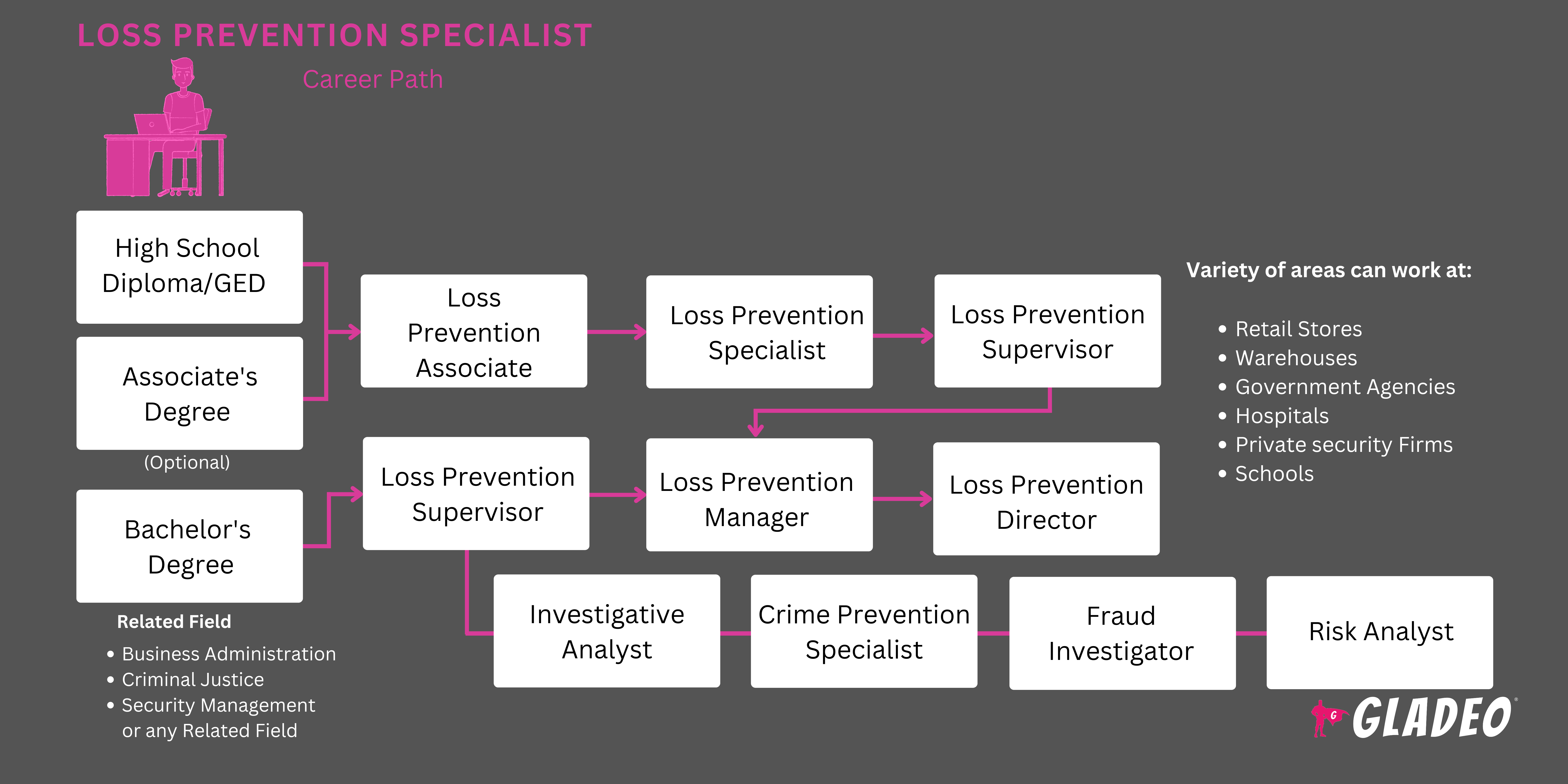Spotlights
Asset Protection Associate (APA), Loss Prevention Agent, Loss Prevention Associate (LPA), Loss Prevention Detective, Loss Prevention Investigator, Loss Prevention Officer, Loss Prevention Specialist, Retail Asset Protection Specialist, Loss Control Manager
In 2023, retail theft cost US businesses over $122 billion in lost revenue. That’s twice as much as was lost in 2019!
Also known as shrink (or shrinkage), retail theft trends are projected to rise even higher as organized retail crime groups continue to up the ante. That’s why stores rely heavily on Loss Prevention Specialists to help mitigate shoplifting and other theft. These specialists do their best to protect assets and maintain the integrity of a company’s operations.
They monitor surveillance systems, analyze security footage, and collaborate with managers and security personnel to find and fix potential risks. They also run investigations into incidents of theft and fraud, working to recover lost assets when possible.
Loss Prevention Specialists often work in retail stores but can operate out of warehouses and corporate offices, too. Their efforts are crucial in minimizing financial losses and maintaining a safe environment for workers and customers!
- Helping prevent theft and fraud
- Contributing to a safe and secure work environment
- Recovering lost assets and minimizing financial losses
- Working in a dynamic and challenging field
Working Schedule
Loss Prevention Specialists typically work full-time, with shifts that may include evenings, weekends, and holidays, especially in retail environments. They may need to be on-call for emergencies.
Typical Duties
- Ensure security systems work correctly (including locks, alarms, and closed-circuit TVs)
- Routinely look around building access points for potential security vulnerabilities
- Conduct audits to identify gaps in security protocols
- Monitor high-risk theft areas, such as loading docks and retail store areas featuring commonly stolen goods
- Recommend items to use security tags and labels on, which to use locking cables on, and which to lock behind a glass cabinet or counter
- Ensure staff are trained on loss prevention policies and procedures
- Identify and report unexplained shortages. Review possible instances of internal theft
- Investigate shoplifting by customers and organized retail crime groups
- Examine invoices and products to screen for vendor fraud
- Maintain detailed records of all security incidents and investigations
- Recover assets and minimize financial losses when possible
- Collaborate with law enforcement agencies and attorneys, as needed
- Supervise contracted security personnel or junior loss prevention team members
- Review other situations where loss of revenue might occur, such as via workplace mishaps, cybercrime, fires, natural disasters, and vandalism
Additional Responsibilities
- Conduct background checks on employees
- Testify in court regarding thefts or related incidents
- Respond to security alarms and emergency situations
- Stay up-to-date on security technologies and trends
- Participate in company meetings. Offer input about improving security strategies
Soft Skills
- Adaptability
- Attention to detail
- Communication skills
- Conflict resolution
- Critical thinking
- Decision-making
- Deductive reasoning
- Interpersonal skills
- Integrity
- Monitoring
- Negotiation skills
- Responsibility
- Problem-solving
- Teamwork
- Time management
- Training skills
Technical Skills
- Familiarity with security systems and surveillance equipment
- Knowledge of loss prevention techniques and best practices
- Ability to analyze security footage and identify suspicious behavior
- Strong report-writing skills
- Understanding of applicable laws and regulations
- Commitment to customer and employee safety
- Retail stores
- Corporate offices
- Warehouses
- Shopping malls
Loss Prevention Specialists must stay ever-vigilant to prevent losses. The work can be stressful, especially when dealing with an active theft situation or security incident. For example, shoplifters may become aggressive when confronted. Some might be under the influence of substances that cause erratic behavior.
Loss Prevention Specialists must remain calm and make swift decisions under pressure. They have to know and follow local laws and employer policies and procedures so they can handle situations properly, legally, and safely. For instance, if they handle a shoplifting situation incorrectly, they can expose their employer to the risk of a lawsuit by the shoplifter they were trying to stop.
Clearly, this role requires a strong balance of vigilance, integrity, and strong problem-solving abilities!
One of the biggest trends in loss prevention is the integration of advanced technology, including artificial intelligence which enables businesses to identify patterns and anomalies that indicate security threats. Additionally, Internet of Things (IoT) devices, such as smart cameras and sensors, are enhancing real-time monitoring capabilities.
Another emerging trend is the adoption of holistic security approaches that integrate loss prevention with overall business operations. Rather than treating loss prevention as an isolated function, companies are embedding these practices into their daily workflows, leading to a more cohesive approach to protecting assets and reducing risks.
Loss Prevention Specialists likely enjoyed following rules, paying attention to details, and observing their surroundings. They may have participated in activities that required analytical thinking and teamwork, such as sports or debate clubs.
- Loss Prevention Specialists need at least a high school diploma or equivalent. ~11% hold an associate degree and 11% have a bachelor’s
- Common college courses include:
- Criminal justice
- Business administration
- Information technology
- Security management
- Security systems and surveillance
- Psychology
- Employers typically provide at least some on-the-job training
- Some employers require a pre-employment background check, valid driver’s license, and state-sponsored public safety training
- Relevant certifications include:
- The Loss Prevention Foundation - Loss Prevention Qualified (LPQ) and Loss Prevention Certified (LPC) certifications
- ASIS - Certified Protection Professional
- A college degree isn’t needed, but an associate's or bachelor’s degree may make you a more competitive candidate when applying for jobs.
- Degrees in security management, criminal justice, or business administration can be beneficial and are suitable for online and hybrid study!
- Check out the program’s job placement rates for graduates.
- Compare tuition and fees costs, noting in-state vs. out-of-state costs.
- Review scholarship and financial aid options, including federal aid Pell Grants.
- Take classes in criminal justice, business, and information technology
- Participate in activities that involve teamwork and problem-solving
- Gain practical experience through part-time jobs or apprenticeships in retail or security
- Stay informed about industry trends and new technologies such as AI
- Network with professionals in the field and seek mentorship opportunities
- Watch YouTube videos about organized retail crime operations and prevention strategies
- Read articles on sites like Loss Prevention Media and participate in online discussion forums such as Reddit
- Try to set up an informational interview with a Loss Prevention Specialist to ask questions…or ask if you can shadow them at work for a day!
- Keep track of your accomplishments on a draft resume

- Apply for law-related internships or apprenticeships to gain practical experience and make connections
- Consider starting as a retail clerk while working on your education and training requirements
- Sign up for alerts on job portals like SimplyHired, Indeed, Monster, and Glassdoor
- Ask people in your network for tips about job openings
- Reach out to local retail stores to inquire about upcoming openings and training programs
- Request former teachers and supervisors to serve as your personal references. Be sure to get their permission before giving out their contact information
- Utilize your school’s career center for help with resumes and mock interviews
- Check out Loss Prevention Specialist resume samples and sample interview questions such as “What would you do if you saw a customer hide an expensive item in their coat pocket?” or “How would you address a case of theft within the team?”
- Make sure your resume is error-free, concise, and up-to-date
- Review Indeed’s How to Dress for an Interview and learn how to make an amazing first impression!
- Talk with your supervisor about promotion or pay raise opportunities
- Pursue certifications or professional development courses relevant to loss prevention and related technologies
- Consider earning a higher-level degree if it’ll help qualify you for a management role
- Train and mentor new Loss Prevention Specialists and store associates
- Stress safety at all times. Don’t jeopardize anyone’s welfare over some merchandise
- Take on leadership positions within professional organizations to gain visibility. Attend conferences to stay updated on trends
- Set goals for continual process improvement and risk reduction
- Publish blogs about theft prevention to establish yourself as an expert in the field
- Develop specialized expertise in a particular area, such as supply chain operations, restaurant loss prevention, or organized retail crime prevention strategies
- Build a strong professional network by connecting with other Loss Prevention Specialists
Websites
- American Association of Port Authorities
- American Management Association
- American Risk and Insurance Association
- American Society of Safety Professionals
- ASIS International
- Association of Certified Fraud Examiners
- Coalition of Law Enforcement and Retail
- Electronic Security Association
- Insurance Loss Control Association
- Jewelers’ Security Alliance
- Loss Prevention Foundation
- Loss Prevention Media
- Loss Prevention Research Council
- National Retail Federation
- Restaurant Loss Prevention and Security Association
- Security Magazine
- Society of Corporate Compliance and Ethics
Books
- Loss Prevention For Retailers: Understanding The Problem Of Shoplifting, by Sharice Yarrington
- Retailing Prevent Loss: Maximizing Security, Minimizing Risk And Implementing Effective Solutions, by Cristi Pashal
- Retail Loss Prevention in the Distribution Chain: How to identify and prevent loss in retail distribution networks, by Tim Trafford and Ian Watts
Loss Prevention Specialists play a vital role in the world of business! However, the job can be stressful and comes with inherent risks–such as having a potentially dangerous encounter with a shoplifter.
For those who want to explore other career options, consider jobs such as:
- Compliance Manager
- Corporate Security Specialist
- Correctional Officer and Jailer
- Detective and Criminal Investigator
- Financial Risk Specialist
- Fraud Investigator
- Gambling Surveillance Officer
- Lifeguard
- Loss Prevention Manager
- Patrol Officer
- Private Detective
- Public Safety Telecommunicator
- Retail Manager
- Risk Analyst
- Security Guard
- Ski Patrol
- Transit and Railroad Police
- Transportation Security Screener
Newsfeed

Featured Jobs

Online Courses and Tools

Annual Salary Expectations
New workers start around $59K. Median pay is $79K per year. Highly experienced workers can earn around $106K.






